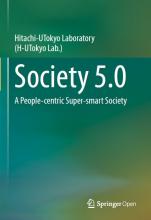Big data analytics, artificial intelligence, the Internet of Things—these are just some of the products of research and development that have become regular fixtures of our daily lives. Our private and professional lives are saturated with digital data and information technology through which we develop and share ideas, which in turn generate one new business after another. Just think how our lives have been trans-formed over the past 10 years, with the rise of the smartphone, new ways of shop-ping, new ways of working, and the like. If we have changed that much in ten years, then how far have we come over the past 50 years, or even the past 30 years? No one could have imagined the phenomenal change. Digital technology has taken us from an industrial society centered on manufacturing into a society where information is king.
Now, we stand at the cusp of a new age. How will we greet this new dawn, and where exactly are we headed?On January 22, 2016, the Government of Japan released the 5th Science and Technology Basic Plan (Cabinet Office 2016a). The plan proposes the idea of “Society 5.0,” a vision of a future society guided by scientific and technological innovation. The intention behind this concept is described as follows: “Through an initiative merging the physical space (real world) and cyberspace by leveraging ICT to its fullest, we are proposing an ideal form of our future society: a ‘super-smart society’ that will bring wealth to the people. The series of initiatives geared toward realizing this ideal society are now being further deepened and intensively promoted as ‘Society 5.0.’”1 An annotation explains the reasoning behind the term Society 5.0 as follows: “(Society 5.0 is) so called to indicate the new society created by transfor-mations led by scientific and technological innovation, after hunter- gatherer society, agricultural society, industrial society, and information society”(see Fig. 1).







